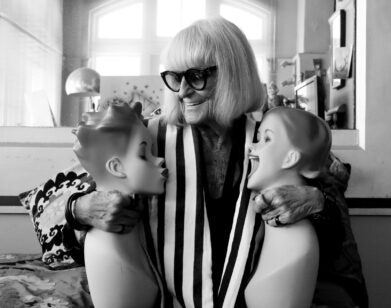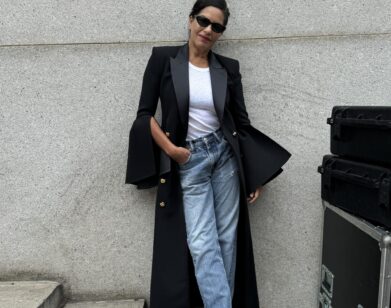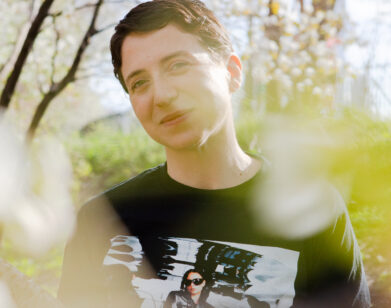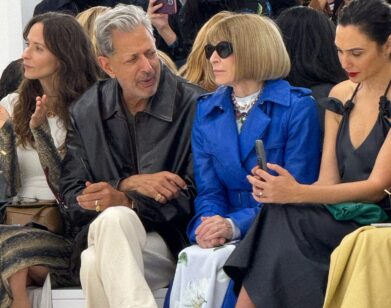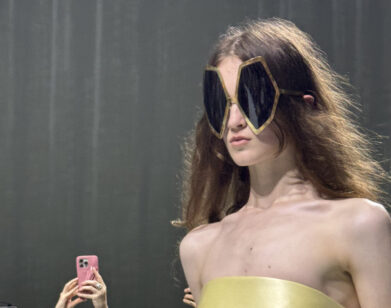OFF MENU
Sex and the City’s Candace Bushnell Is Still Playing Herself

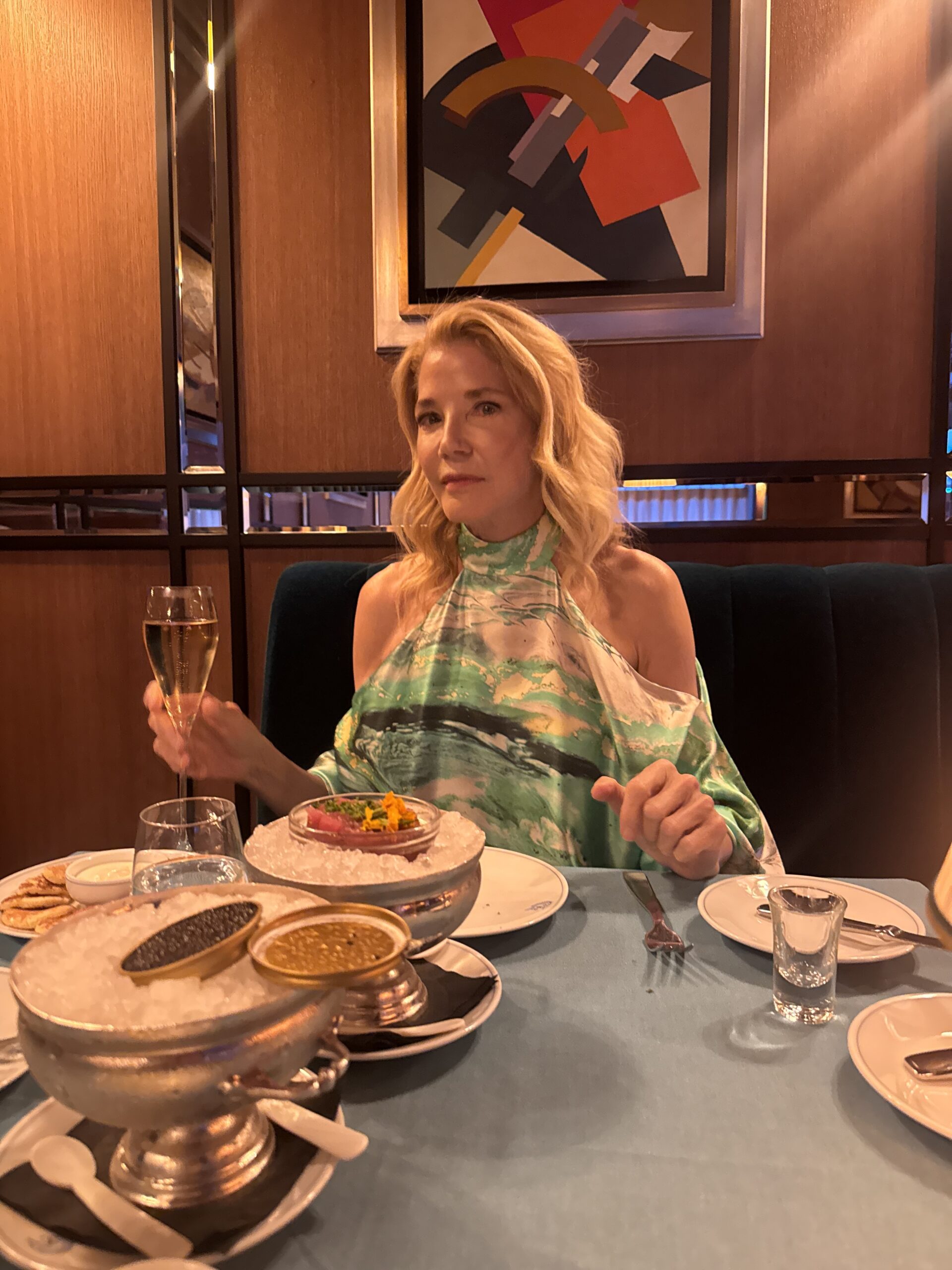
TUESDAY 7:14 PM MAY 20, 2025 UPPER EAST SIDE
Candace Bushnell is the voice of many generations. Even if you haven’t read her books (there are nine), you know her story. Girl moves to New York, girl gets a column, girl adopts the pen name Carrie Bradshaw so that her parents won’t find out that the salacious stories in Sex and the City are about her. Actually, that last part I learned when I attended Bushnell’s one woman show: True Tales of Sex, Success, and Sex and the City a few Fridays ago at Sony Hall. There, a crowd of mostly middled-aged women sipped mostly cosmopolitans, while the 66-year-old Bushnell, decked out in a feather dusted lilac dress and a hot pink pair of what I assumed were Manolos, told the story of her life. She was charming, captivating, and hit all her marks, but the woman on stage didn’t reflect the one that I knew on paper, the author whose work is both commercial and controversial, who isn’t afraid to pen her female characters as problematic as she sees her men. Did that woman consider herself an optimist? Was she sick of performing her life? These were some of the questions I asked Candace the following week during a champagne-fueled dinner date at Caviar Kaspia at The Mark on the Upper East Side.
———
TAYLORE SCARABELLI: It’s so nice to meet you. You’re such an inspiration, obviously.
CANDACE BUSHNELL: Oh, thank you.
SCARABELLI: It was really fun to see your show the other night. How are you feeling after that little tour?
BUSHNELL: I feel good. But it takes up a lot of time and energy because I’m like a one-man band. I plan the trips. I get the flights. I book the car, da, da, da. And then you have to do publicity for the shows. If it was just performing and getting up on the stage, then it’d be great.
SCARABELLI: Was performing something you’ve always been into? Or is this a new thing?
SPEAKER 3: Anything to drink?
BUSHNELL: Yes. Can I get a glass of champagne, please?
SCARABELLI: I’ll do the same—
BUSHNELL: So, when I was a kid, I had some thoughts of, “Oh, maybe I’ll be an actress,” because that seemed to be something where, as a woman, you could make money. There weren’t a lot of professions where you could make money back then. When I first came to New York, I went to acting school at HB Studio.
SCARABELLI: Oh!
BUSHNELL: I was not one of the special students, but I lived with three women who were actresses.
SCARABELLI: Okay, that sounds fun. Or scary.
BUSHNELL: Yeah. They were always singing. [Laughs] But it was very hard to maneuver in that world if you were a young woman because there was a lot of casting couch stuff. If you don’t know anybody in the business, then it’s like—
SCARABELLI: Scary.
BUSHNELL: Yeah. It was something where you had to feel like, “If I don’t do this, I’m going to die.” And that was how I felt about writing, which I’m not sure is the smartest way to be about one’s life.
SCARABELLI: That’s the New York experience, though. To make it happen here, you need that kind of drive.
BUSHNELL: You do, otherwise it’s too competitive. But I did do some TV. After the Sex and the City column came out, I had a show on VH1 called Sex, Lies, and Video Clips. Every week we explored a different sexual theme. One week it was bondage—
SCARABELLI: That sounds like Real Sex. Were you out on the streets talking to people?
BUSHNELL: Yes, and then we went to a dungeon and pretended to spank each other and looked at nipple clamps, which are just clothespins.
SCARABELLI: Right.
BUSHNELL: I’m like, “You know what? This is not for me. I’m sorry.”
SCARABELLI: So you had some on-camera experience.
BUSHNELL: Yes. Then I was on a couple of reality shows. But back then, I really wanted to write novels, so that’s what I did. And then the opportunity for this one-woman show came up and people said, “You can do this.” It’s a very particular experience being on stage in all these different theaters, it’s very analog.
SCARABELLI: It’s just you up there. The show is 90 minutes long. That’s a lot of dialogue to memorize. Do you ever improvise?
BUSHNELL: No, because I have cues I have to hit. But I try to find different ways to say it, which I guess is what acting is. I also watch women stand-ups like Chelsea Handler. I find it so interesting because it’s choreographed, but it looks natural.
SCARABELLI: It’s all about timing. But it’s impressive that this is something you started to do when you were what, 60?
BUSHNELL: 62.
SCARABELLI: Incredible. But also you’ve had a lifetime of experience being an It Girl and performing as yourself. That’s how I think of being in New York: you go to a party, you turn it on.
BUSHNELL: Yes. It was something that was very true before social media. Going out in New York was theater. People didn’t go to restaurants for the food. They went for the show.
SCARABELLI: Yeah. Now people complain about TikTok kids not having that thing. They’re like, “I know how to perform for this little screen, but I don’t know how to make eye contact.”
BUSHNELL: And in New York you have to know how to talk to strangers. Other people are difficult to avoid. But if you go up to an influencer and say, “Who are you?” They shrivel up a little.
SCARABELLI: They’re like, “Don’t perceive me.”
BUSHNELL: Which is weird because—
SCARABELLI: They want to be famous. Do you want to order food?
BUSHNELL: Yeah. Maybe I’ll do the baked potato with caviar and some medallions of Maine lobster.
SCARABELLI: That sounds good. Maybe we can try some different caviars. I’ll get the crab salad.
BUSHNELL: Great. All of a sudden I’m hungry.
SCARABELLI: Me too. So I wanted to ask you if you read that article in New York magazine about the West Village Girls.
BUSHNELL: By Brocky baby. [Brock Colyar]
SCARABELLI: Yes! It’s about these girls coming to New York to live their Sex and the City fantasy. Some are in finance or marketing. A lot of this story was about how these girls all dress the same as a means to figure out where they fit in, which is ultimately not that different than an artist who is dressing in an over-the-top way to signal their subcultural cred. People are like, “It’s so sad, they all dress in light wash jeans and white shirts, and everybody looks the same.” I’m like, “You all look the same when you go out with your friends, too.” It’s just the opposite end of the spectrum.
BUSHNELL: I mean, we live in New York City, the fashion capital of the world, and yet how many people in fashion have the same thing?
SCARABELLI: Apparently a lot. Everyone’s wearing the same It bag they were gifted last season.
BUSHNELL: Fashion is a way that people signal that they belong to a certain group. It’s human nature. We’ve been doing it forever.
SCARABELLI: And these girls are owning it. They’re like, “Yeah, I am basic. It helps me make friends.” It’s a different story than you or I, who came to New York with this drive of, I need to be an artist or writer or whatever. Their struggle is maybe less about earning money and more about finding their community.
BUSHNELL: But if these girls are in finance, making their own money, that’s great. It’s a different kind of young woman now than it was when I was writing Sex and the City. In the mid ’90s, it was very daring for women to work in finance or to even have their own money. You were supposed to get married because most women couldn’t make enough money to afford their own apartment, even if they had a career.
SCARABELLI: That reminds me of Tama Janowitz’s Slaves of New York, which has a lot to do with the horror of needing a man to provide housing or help with the bills. I thought of it when I was reading your book 4 Blondes yesterday. It deals in a similar narrative. I always love when there’s a really toxic female protagonist.
BUSHNELL: I love that book. Bret Easton Ellis said, “I am so happy to know somebody who can write a book like that,” because it was so daring. Most women hate that book because they don’t understand how women used to have to operate in the world.
SCARABELLI: So for our readers, there’s four stories. One of the protagonists is an aging model who’s trying to get a man to host her in the Hamptons each summer. She deals with a lot of terrible guys, even a Harvey Weinstein type, but eventually she liberates with some crazy Victoria’s Secret contract. Her slogan is, “I don’t know what I want to do, but I want to do something.” She eventually becomes the toxic guy with the Porsche and the big empty mansion. It’s a beautiful screed on lean-in feminism before that concept even existed.
BUSHNELL: Exactly. I was like, “Why isn’t anybody noticing how much this sums up the mentality of a woman at a certain time in her life?”
SCARABELLI: Then the last story has a character who is more you or Carrie Bradshaw.
BUSHNELL: It is me. That piece I did originally for the Daily Mail, they paid me about $25,000.
SCARABELLI: Wow.
SPEAKER 3: Here’s the caviar tasting. White sturgeon, Baerii, Imperial Baerii, Royal, Selection. That being the lowest grade going around clockwise, that being the highest grade. Enjoy.
BUSHNELL: Thank you.
SCARABELLI: We also wanted to get a couple other things. The tuna tartare.
BUSHNELL: And then I’m going to get the medallions of lobster. Thank you.
SCARABELLI: Okay, so at the end of 4 Blondes, she meets a man on an airplane and it’s happily ever after—which feels kind of out of place next to all these other horrific stories. Do you often feel obliged to end your work on a high note?
BUSHNELL: Usually your publisher or editor or whatever at that point says, “We’ve got to give it a happy ending.” I mean, the end of Sex and the City is also super weird because of something Bret Easton Ellis said. It was this joke of, “You ate the pickle.” I said, “I’m going to use that in the last line of Sex and the City.” And I did.
SCARABELLI: Endings are hard. I read an interview where you spoke about books you’ve written that didn’t get published and I’m curious what those books were like.
BUSHNELL: Well, one of them was really surreal. Or at least that’s what they kept saying.
SCARABELLI: Was it too experimental or something?
BUSHNELL: Probably. I think you’re in a certain category in publishing, and they want you to write a certain kind of book. You realize it’s not really about how good you are, it’s just about fitting into an entertainment machine. I think that’s been generally true, probably forever.
SCARABELLI: Do you consider yourself an optimist or a pessimist?
BUSHNELL: I consider myself a realist. I think people are very flawed.
SPEAKER 3: [Serves food] Would you like another glass of champagne?
BUSHNELL: I would, actually. Thank you.
SCARABELLI: Wait, let me get a quick pic. Gorg. Okay, so I have a question. Do you think it’s easier to be truthful writing fiction or nonfiction?
BUSHNELL: I mean, they always say, “You can be more truthful with fiction because you can create characters and make them more appealing.”
SCARABELLI: Or less appealing, in your case. But I agree with that, especially in the age of social media—with all the scrutiny and the constant arguing. Any type of criticism right now is really hard to do because everyone’s like, “How could you say that? You’re wrong.”
BUSHNELL: I understand that. It’s very difficult to express any kind of critical thinking, really. People don’t get it. People are very flat now. And they’re flat because they are online a lot.
SCARABELLI: Yeah.
BUSHNELL: But there was always the irony problem. Americans don’t really get irony.
SCARABELLI: Or they expect everything to fit their idea of how things are. And I think that’s because people are constantly fed their preferred political or personal point of views through the people they choose to follow or through the algorithm. And anything that diverges from that is shocking and instantly perceived as wrong. Everyone is just so used to their specific version of reality.
BUSHNELL: Yes. But honey, you know what it is? It’s imagination. Imagination is what’s lacking.
SCARABELLI: Yeah.
BUSHNELL: Because imagination is what allows you to put yourself in somebody else’s shoes and see a different point of view, et cetera. One of the things I’ve read online in the last couple of weeks, which is actually shocking to me, are guys commenting that Sex and the City is not real because nobody has that much time to spend with their friends.
SCARABELLI: Because everybody is too busy scrolling on their phones.
BUSHNELL: It’s true. I had way more time in the ’90s. But these guys don’t even have the ability to imagine that something other than their reality could be true. That’s so scary to me. It’s one thing if you haven’t experienced it, but it’s another thing to say, “I haven’t experienced it, therefore it can’t exist.”
SCARABELLI: Right. This brings us to And Just Like That, where there’s all this backlash around how the show looks and how these characters have changed over time. Things are different and people are unhappy but I find it extremely entertaining. Do you find the new show reflects where you’re at in your life?
BUSHNELL: I did not marry my Mr. Big. That’s one of the biggest differences between Carrie Bradshaw and me. I became my own Mr. Big, for whatever that’s worth. But Michael Patrick King, the producer and the head writer, does an amazing job. I could never do a TV show like that. Ever.
SCARABELLI: So what’s capturing your attention right now? Are you working on anything new?
BUSHNELL: I’m doing the show and I’m going to write this piece for New York magazine about dating over 60 using my real-life experiences.
SCARABELLI: Cool.
BUSHNELL: My TikTok is filled with women talking about dating. And in my particular feed, none of their experiences are good. For the first time ever, I am seeing women admit that heterosexual relationships are not that great for them.
SCARABELLI: Wait, so you’re actively dating right now?
BUSHNELL: I don’t actively date. What does that mean?
SCARABELLI: Well—
BUSHNELL: Actually, I always think, “No, I don’t date anybody.” But then when I look back on the last five years, I suppose I’ve had dates. Nothing’s led to anything.
SCARABELLI: During your show you said something like, “After menopause, there’s two types of women: women who are really horny or women who don’t want to see a man ever again.” Which camp are you in?
BUSHNELL: I don’t know. If somebody came along and it worked, great. But I’m not the lady who I met in New Orleans who said, “I’m 70 years old, and I’ve got a man in every port I go to.” [Laughs]
SCARABELLI: Amazing. It sounds cliche, but as a woman in my thirties, thinking about the future and motherhood and all these things—nobody talks about menopause. Nobody talks about dating later in life. A lot of your one-woman show is super light, but then you also take on these really complex moments that people are afraid to talk about. It’s very compelling
BUSHNELL: Well, that’s one of the reasons why I do the show. It gives me a chance to put in at least 4% important feminist stuff. But it’s very difficult to get women to listen to these other ideas.
SCARABELLI: Actually, I was so shocked walking in there. I expected at least half the audience to be gay men but it was basically all middle-aged women.
BUSHNELL: That’s because it’s really about feminism and the reality of women’s struggles to be a person in the world. It’s for women.
SCARABELLI: And yet there’s been such a backlash against feminism recently. It feels like that word has lost meaning.
BUSHNELL: There’s always a backlash against feminism. People don’t even know what feminism is. It’s about women being able to operate as an independent entity in the world, in both mind and body. And, right now, we don’t live in that world. Some women are able to do that, but a lot of women aren’t because of income disparity and—
SCARABELLI: Which reminds me of AJLT, how the women are grappling with the fact that they’re not of this new generation, that they’re problematic or they have to learn how to think differently about things. How does that relate to your experience as a white woman and a feminist?
BUSHNELL: What will be will be. That’s my answer.
SCARABELLI: Okay.
BUSHNELL: Listen, I’ve dealt with a lot of gatekeepers in my life. And eventually, one understands that’s just the ebb and flow. I can’t control if people love me or hate me, but I’m still going to do what I do. If you feel like you’re here maybe for a reason, then you just keep pursuing that for as long as you can. I think people’s thinking is much more sophisticated than it used to be and that’s fantastic. I mean, there were so many things that we didn’t have growing up. People didn’t even believe in child abuse.
SCARABELLI: Right. I wonder—because I would imagine that after being in the spotlight for so long one might want to disappear or they feel like, “It’s too much being me or doing my work.” How are you navigating that?
BUSHNELL: I saw a 54-year-old woman on TikTok the other day who was like, “I don’t know if I should just give it all up and let my hair go gray or get plastic surgery.” The reality is, nobody knows how to be middle-aged or elderly.
SCARABELLI: People can’t even handle turning 40.
BUSHNELL: You can handle turning 40, I promise you. It’s not that big of a deal. [Laughs] Also, there’s so much better skincare. You have Botox. You’re never going to have to have a forehead wrinkle.
SCARABELLI: Absolutely not. I’m going to get a facelift in two years. [Laughs]
BUSHNELL: I used to have this radio show and I had a plastic surgeon on it. I come from Connecticut where it was like, “You don’t get plastic surgery, you live with your flaws.” So I was a little against plastic surgery. And I asked her, “Why do you think so many people are getting plastic surgery?” And she said, “Because they can.” Human beings always, in general, want to improve themselves.
SCARABELLI: Also, being a public person in the city for so long is hard. You have to keep up appearances. How do you feel about all of that?
BUSHNELL: First of all, you have to have a stylist. Because you have to go out and have something different on every single night—that sounded very shallow and superficial.
SCARABELLI: But it’s true. Particularly as a woman in media.
BUSHNELL: It’s a very particular New York world. And I suppose we don’t have to live in it, but it’d be sort of boring not to. But I will say, the difference between doing a one-woman show and writing books is they don’t pay as much attention to how you look.
SCARABELLI: And what do you prefer?
BUSHNELL: Well, actresses look good because they pay a lot of attention to how they look. It’s time-consuming—
SCARABELLI: It’s a full-time job.
BUSHNELL: And you weigh the time versus the expectations. That’s why I didn’t keep doing that show on VH1. Because I’d spend two hours a day doing hair and makeup and I didn’t want to do that. And that’s one of the realities of living in this age. Grooming is really heightened. When I was a teenager in the ’70s, you didn’t even have to shave your legs.
SCARABELLI: I’m obsessed with the late ’70s fashion scene. I recently watched a few experimental films and you see the women have such unique, beautiful faces. No nose jobs. No filler. Today, those same women might be like, “You don’t have your lips done? You look crazy.”
BUSHNELL: That’s so true.
SCARABELLI: It’s all about looking as young as possible while looking like you’re wearing as little makeup as possible, but then you have 20-something year olds doing all these crazy med spa interventions. I’m not against that. I love Botox and lip filler. But I find the sameness boring.
BUSHNELL: That’s interesting. Because we didn’t have any of those things until I was probably 34. I was writing for Vogue and Anna Wintour sent me to get these collagen lip injections.
SCARABELLI: Love!
BUSHNELL: There are all these beauty standards and you have to spend a lot of money keeping up. But, on the other hand, I go on dating apps and see men who haven’t done anything. You know what I think? Dude, dye that hair.
SPEAKER 3: Desserts?
BUSHNELL: Sure. Let’s split one, even though I’m not supposed to eat dessert.
SCARABELLI: For feminism. [Laughs]
SPEAKER 3: Digestifs?
BUSHNELL: Now, if I were younger, I would say, let’s go to Casa Tua.
SCARABELLI: What’s Casa Tua?
BUSHNELL: It’s a bar in the Surrey Hotel. It’s very loud.
SCARABELLI: Is it a private club?
BUSHNELL: Yes. There might be some single men there, actually. You can be my guest.
SCARABELLI: Let’s go! Should I stop recording?
BUSHNELL: Yes.

